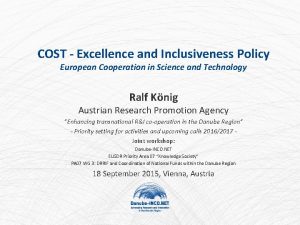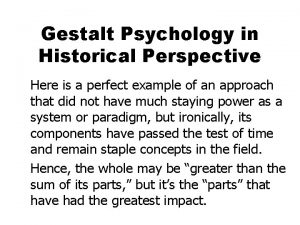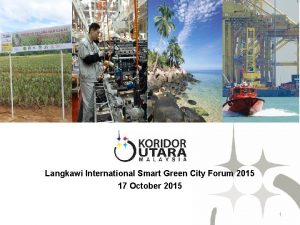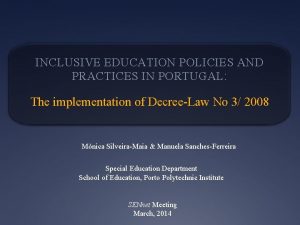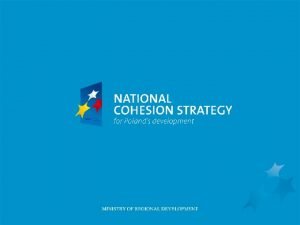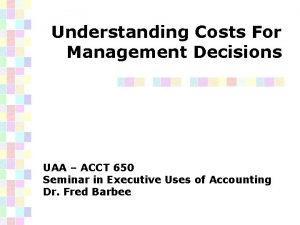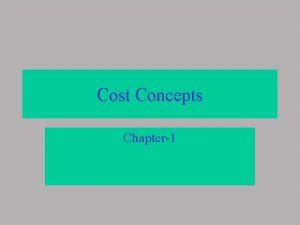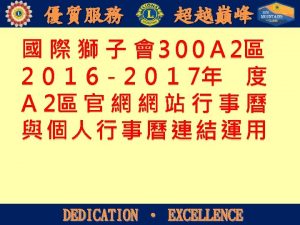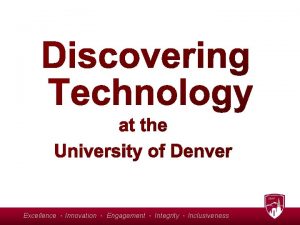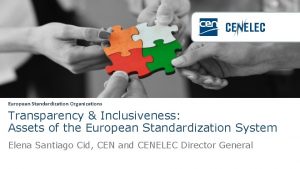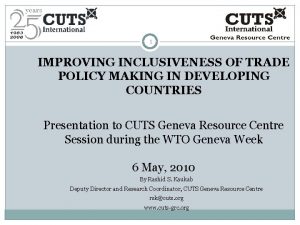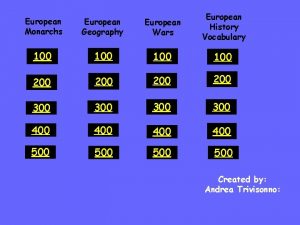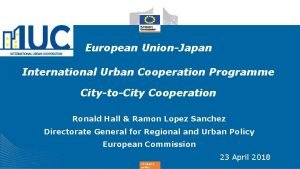COST Excellence and Inclusiveness Policy European Cooperation in











- Slides: 11

COST - Excellence and Inclusiveness Policy European Cooperation in Science and Technology Ralf König Austrian Research Promotion Agency ”Enhancing transnational R&I co-operation in the Danube Region” - Priority setting for activities and upcoming calls 2016/2017 Joint workshop: Danube-INCO. NET EUSDR Priority Area 07 “Knowledge Society” PA 07 WG 3: DRRIF and Coordination of National Funds within the Danube Region 18 September 2015, Vienna, Austria

COST - European Cooperation in Science and Technology Mission: Enable breakthrough scientific and technological developments through bottom-up trans-European networking Ø A new legal entity, the COST Association, integrating COST governance, management and implementation functions Ø Intergovernmental Pan-European Framework - 36 COST Member Countries Ø COST Excellence & Inclusiveness Policy § Focus on countries that can benefit from more visibility, gender - balance, young talents and next generation leaders Ø EUR 300 million budget (constant prices) for 7 years drawn from two Horizon 2020 work programmes: § Societal Challenge 6 “Europe in a changing world - inclusive, innovative and reflective Societies” § “Spreading Excellence and Widening Participation”

COST - European Cooperation in Science and Technology Ø COST Actions feature three key principles: § Openness, § Excellence and § Inclusiveness, achieved by fostering new ideas, sharing knowledge and an output orientation. Ø Openness § All fields of S&T (including interdisciplinary, new and emergent fields) § All partners (public and private, big and small) § All countries (COST Member Countries, Near Neighbour Countries and International Partner Countries)

COST - European Cooperation in Science and Technology Ø Open Call - Two Collection Dates per year (Spring and Autumn) Ø New Submission, Evaluation, Selection and Approval (SESA) Rules and Procedure § SUBMISSION: by a Main Proposer on behalf of a network of proposers (minimum five countries) § EVALUATION: Remote Evaluation by independent External Experts and Revision by ad-hoc Review Panels § SELECTION: COST Scientific Committee (SC) § APPROVAL: Committee of Senior Officials (CSO) Ø Participate: www. cost. eu/participate/open_call

COST - European Cooperation in Science and Technology Ø COST 36 Member Countries Austria, Belgium, Bosnia and Herzegovina, Bulgaria, Croatia, Cyprus, Czech Republic, Denmark, Estonia, Finland, France, Germany, Greece, Hungary, Iceland, Ireland, Italy, Latvia, Lithuania, Luxembourg, Malta, Montenegro, The Netherlands, Norway, Poland, Portugal, Romania, Serbia, Slovakia, Slovenia, Spain, Sweden, Switzerland, Turkey, United Kingdom and the former Yugoslav Republic of Macedonia. Ø COST Cooperating State Israel Ø COST Near Neighbour Countries Albania, Algeria, Armenia, Azerbaijan, Belarus, Egypt, Georgia, Jordan, Lebanon, Libya, Moldova, Morocco, the Palestinian Authority, Russia, Syria, Tunisia and Ukraine Ø COST International Partner Countries Argentina, Australia, Bangladesh, Brazil, Canada, Chile, China, Colombia, Costa Rica, Hong Kong, India, Indonesia, Iraq, Japan, Republic of Korea, Mauritius, Mexico, Namibia, New Zealand, Pakistan, Peru, Saudi Arabia, Singapore, South Africa, Sudan, Thailand, United Arab Emirates, United States of America and Uruguay

COST - European Cooperation in Science and Technology Excellence and Inclusiveness Policy … is tailored to bring out excellence in science Europe-wide and clear away obstacles by creating cooperation opportunities for researchers, engineers and scholars from all COST Member Countries Features Through bottom-up, open and excellence-driven COST Actions and activities, the policy nurtures talent and creativity. It is developed around three main elements : § geographical spread § career stage: involving early career investigators § gender balance Geographical spread Includes less research-intensive COST Member Countries which are entitled COST Inclusiveness Target Countries (ITCs): Bosnia-Herzegovina, Bulgaria, Cyprus, Czech Republic, Estonia, Croatia, Hungary, Lithuania, Latvia, Luxembourg, Malta, Montenegro, Poland, Portugal, Romania, Slovenia, Slovakia, the former Yugoslav Republic of Macedonia, Serbia and Turkey

COST - European Cooperation in Science and Technology Excellence and Inclusiveness Policy Objectives § § § Identifying excellence in science and technology across Europe Increasing research communities' access to funding and infrastructures Triggering structural changes in COST Member Countries' national research systems To reach these objectives, COST Action activities will focus on: Ø Leadership encouraging researchers and institutions in ITCs to set up and lead COST Actions, as well as manage COST Action grants Ø Increasing researchers' visibility and connection, no matter their location, age or gender, to leading European science hubs

COST - European Cooperation in Science and Technology Excellence and Inclusiveness Policy COST responses to two major challenges of Horizon 2020: § Europe in a changing world – inclusive, innovative and reflective societies § Spreading excellence and widening participation Ø COST is referred to as a key contributor to the above Programmes’ strategic objectives, given its support particularly towards pan-European cooperation in science and technology Ø By fully developing and implementing its Inclusiveness Policy, COST aims to increase ITCs researchers’ participation in COST Actions and activities, in relation to the European Commission’s approach to widening participation Ø 50% of the COST budget will be dedicated to activities fulfilling the objectives above, with a focus on engaging researchers in Inclusiveness Target Countries (ITCs).

COST - European Cooperation in Science and Technology Excellence and Inclusiveness Policy Objectives that COST has set forth in order to help tackle these challenges are: § Joining research efforts and developing common S&T programmes by coordinating nationally funded research activities led by pan-European, high quality, collaborative S&T networks; § Building capacity by providing networking and leadership opportunities for emerging talents and thereby strengthening and building up excellent S&T communities; § Addressing societal questions by promoting trans-disciplinary, new approaches and topics and identifying early warnings of unforeseen societal problems aiming at contributing to Societal Challenges; § Strengthening the COST Inclusiveness Policy by fostering better access and integration for researchers from less research-intensive countries into the knowledge hubs of the European Research Area aiming at contributing to the Widening Pillar of Horizon 2020.

Contact Ralf König FFG - Austrian Research and Promotion Agency Division European and International Programmes Sensengasse 1 A-1090 Vienna, Austria Phone: +43 (0)57755 - 4601 ralf. koenig@ffg. at 10

 Cost excellence
Cost excellence European cooperation for accreditation
European cooperation for accreditation Principle of inclusiveness gestalt
Principle of inclusiveness gestalt Inclusiveness images
Inclusiveness images Gestalt law of inclusiveness
Gestalt law of inclusiveness Eden european destinations of excellence
Eden european destinations of excellence Cost benefit analysis european commission
Cost benefit analysis european commission Agriculture cooperation and farmers welfare
Agriculture cooperation and farmers welfare Cost accumulation and cost assignment
Cost accumulation and cost assignment Cost accumulation and cost assignment
Cost accumulation and cost assignment Cost pools
Cost pools What is a period cost on the income statement
What is a period cost on the income statement
